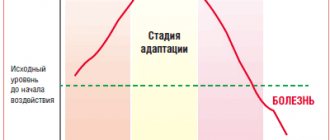Work, family, everyday problems, social obligations... You need to be on time everywhere and not forget anything. Sound familiar?
Life is sometimes like running on a wheel. It requires constant concentration and nervous tension. If something goes wrong, we feel tired and drained, not realizing that we are experiencing chronic stress.
To counter this condition, you need to understand what it is. What is stress? Stress is our body's reaction to various changes, both inside and outside of us. It can be short-term, or it can last for years.
We feel tired and empty without realizing that we are experiencing chronic stress.
With short-term exposure, it helps to pull yourself together and get out of a difficult situation with dignity, but with prolonged exposure to stress, the effect is exactly the opposite. Each of us has our own reaction to stress; psychological stability is mainly responsible for this, which we will talk about in a separate article.
The causes, which can be divided into 8 groups:
- chronic fatigue, lack of time for recovery and proper rest;
- excessive excitability of the nervous system;
- financial difficulties;
- disappointment in yourself and life;
- low self-esteem;
- tense family situation;
- excessive perfectionism;
- conflict situation at work.
What signs indicate chronic stress?
Signs of Chronic Stress
Symptoms of stress fall into four categories:
Physiological symptoms
They manifest themselves in increased blood pressure, chest pain, migraines, insomnia, decreased appetite or, conversely, its excessive increase. The person feels apathy, fatigue and weakness. He loses interest in the opposite sex.
Social symptoms
They are expressed in increased conflict, sometimes out of nowhere. Often the “victims” become close and dear people, upon whom accumulated tension and anger fall.
Emotional symptoms
They manifest themselves in aggression or tearfulness, irritability. A person experiences sudden outbursts of anger, and his or her mood may change dramatically.
Cognitive signs
This is a decrease in concentration, memory impairment. At the same time, the criticality of thinking and the perception of new information changes. A person copes worse with problems and tasks, loses professional skills.
Stress has a destructive effect on the entire body, not just on the emotional state and cognitive functions. Our entire body is permeated with nerve endings. If it begins to affect the nervous system, chaotic signals can go throughout the body, all depending on what is actually happening in the body. For example, your shoulder may hurt even though there is no damage to it.
Nerve endings are our only way of communicating with the world. Thanks to them, we feel touch, the temperature of objects, even sound and image enter our brain through nerve fibers
That is why any disorder of the nervous system affects our communication with the outside world. Our body needs stress, but its excess must be kept under control.
How does chronic stress manifest?
The development of this condition takes months. Most often, the start of treatment for chronic stress is delayed due to erroneous diagnoses and untimely contact with psychiatrists.
The patient gradually develops:
- a constant feeling of fatigue, weakness, heaviness in the body, which is not relieved either by a short rest or a regular vacation lasting 2-3 weeks;
- progressive apathy, reaching depression, a desire to withdraw into oneself, irritation from communicating with people. The patient experiences uncertainty and dissatisfaction with himself, which may give way to hopelessness;
- symptoms of physical illness - dizziness, headaches, poor sleep, impaired appetite, constipation alternating with diarrhea, increased heart rate, high blood pressure, problems in sexual life;
- sudden changes in mood - irritability quickly replaces indifference, panic attacks and fears occur, the patient experiences constant anxiety;
- decreased mental abilities, memory, emotional narrowing;
- vegetative problems - fear of light and noise, trembling in the body and hands.
It is not always easy to determine whether a person has developed chronic stress, because... Such complaints can imitate various diseases. Therefore, a person suffering from chronic stress often has to “run around” to different specialists while doctors correctly diagnose the existing pathology and prescribe appropriate therapy.
Doctors identify 7 physiological symptoms
Official medicine associates stress with a long list of physiological symptoms. Let us dwell on the most important of them, which cannot be ignored.
Headache
When we have a headache, we usually think it is a reaction to the weather or overwork. More medically advanced people blame bad blood vessels or high blood pressure. However, they forget that vasospasm and surges in blood pressure can also be triggered by stress.
Chronic pain
The mechanism of long-lasting pain may be of a stressful nature. The brain seems to “remember” that it is necessary to send pain impulses to a specific place. The stress hormone cortisol is to blame for this, which prevents you from being distracted and “forgetting” about the pain. If a person is calm, he relaxes, experiences pleasant emotions and pain subsides, but in a state of prolonged stress this does not happen.
Frequent illnesses
If colds are frequent in your home, perhaps it is not the bad climate that is to blame, but prolonged stress. Excessive emotional stress damages our immune system and makes us more susceptible to infections. In one medical study, subjects were divided into groups with high or low stress levels. Over six months, people with increased stress had 70% more respiratory infections. This topic is covered in detail in the book “Stress and acute respiratory infections” by N. Graham, R. Douglas.
Sleep disorders
Stress affects sleep patterns depending on the individual characteristics of the body. Some suffer from insomnia, while others, on the contrary, are overcome by excessive drowsiness. Due to shallow sleep, there is no feeling of complete rest when waking up. The most typical situation is early awakening, when a person cannot fall asleep due to anxious thoughts about the situation that worries him. You can learn more about the causes of insomnia and ways to combat it here
Changing eating habits
Stress also affects appetite in different ways. Some people experience emotional hunger; they literally “eat up” problems. Nervous overload and negative mood cause a passionate desire to eat “something tasty”: fast food, sweets, exotic dishes. As a result, extra pounds are not long in coming. The opposite case also occurs when, under stress, a person loses his appetite and suddenly loses weight.
Digestive problems
Against the background of nervous tension, the digestive system is one of the first to suffer. Trouble is indicated by a feeling of heaviness and pain in the abdomen, heartburn, and abnormal bowel movements. The most common diagnoses that doctors associate with uncontrolled stress: gastritis, irritable bowel syndrome, peptic ulcer.
Decreased libido
Many people experience decreased sexual desire during stressful periods. This is especially true for the fair half of humanity. The study “Chronic Stress and Sexual Function in Women” by American psychologists L. Hamilton and S. Meston draws a connection between high levels of stress and decreased sexual arousal.
Other signs
In addition to physiological changes, doctors identify emotional symptoms. Nervousness, irritability, anxiety for no apparent reason, attacks of melancholy and apathy, feelings of guilt and dissatisfaction with oneself are just the tip of the “stress” iceberg. Our physiology and psyche are inextricably linked; it is not without reason that people say that “all diseases come from nerves.”
A person exhausted by unpleasant symptoms changes his behavior. When emotional resources are depleted, this inevitably leads to increased conflict with others, absent-mindedness at work, and the emergence of bad habits. Stress also affects the intellectual area, causing loss of concentration, forgetfulness, and difficulty making responsible decisions.
Symptoms of stress
The human psyche is one of the most vulnerable vital systems of the body. If you do not pay attention to the signs of its disorder in time, the disease can worsen and lead to other diseases, since the nervous system controls a large number of vital processes.
It is necessary to consult a specialist in cases where: - insomnia; - memory impairment; - severe irritability; - deterioration of attention and concentration; — chronic fatigue, accompanied by drowsiness and decreased performance; - obsessive thoughts; - increased anxiety and strong fear of the future; - regular headaches and dizziness; - loss of appetite and indigestion; - cardiopalmus; - pressure surges.
What is the difference between acute stress?
This condition is quite easy to recognize. It is a response to exceptional events, for example: a natural disaster, a threat to life, an accident, criminal behavior, the loss of a loved one. Reactions to an acute stressful situation depend on a person's individual vulnerability and ability to adapt.
The main signs of acute stress include:
- nausea;
- chest pain;
- dizziness;
- accelerated heartbeat;
- aggressive behavior;
- inadequate reactions (stupor, panic, etc.);
- disorientation in space and time.
Treatment of stress and depression
Depression and stress can lead to harmful drug and alcohol addictions. The severity of depression varies. Only specialists know how to get rid of depression. Endogenous depression will be associated with mental illness and heredity, and will not go away on its own without proper treatment. Reactive depression occurs as a reaction to a difficult situation in a person’s life.
Accordingly, treatment will be different for different reasons for its occurrence. In the first case, treatment for depression can only be prescribed by a psychiatrist, in the second by a psychotherapist. The patient is diagnosed using a depression scale and undergoing various tests and studies.
After an accurate diagnosis, treatment is prescribed, which includes: - tranquilizers; - antidepressants; - psychotherapy.
Treatment at home is doomed to failure, since only a comprehensive approach from a specialist can help get rid of prolonged depression or chronic stress.
Important. Prolonged depression can lead to suicide, which is why it is so important to treat it promptly
Treatment
First of all, it should be mentioned that stress can be avoided. You can start treatment yourself. To do this, you need to learn to cope with stressful situations. It is necessary to use relaxation techniques or deep even breathing. Simple physical activities, such as simple exercises, will improve health and increase a person's ability to resist. Eliminating harmful substances (coffee, alcohol, nicotine, etc.) from your life will reduce anxiety. It is imperative to learn how to cope with your phobias. This will be taught by qualified doctors of the Rehab Family clinic, recognized in Europe and America. The rules guarantee complete confidentiality. The Rehab Family clinic is distinguished not only by effective treatment methods, but also by providing comfortable conditions for the complete adaptation of patients.
At the beginning of treatment, it is necessary to discuss its stages with loved ones, explain your actions and emotions, so that they can also help or, at least, not interfere. The treatment prescribed by the doctor must be strictly followed. Its course is usually observed in dynamics during visits. Patients of the Rehab Family clinic can seek help at any day and time. The disease, like our doctors, has no holidays.
Treatment after stress
In order to eliminate the irritant and understand what situation or event prevents a person from being in a harmonious state, you can keep a diary. With its help, you monitor your own reactions. Detachment from people and situations that cause discomfort and tension improves living conditions.
Working on thinking helps change the reaction to a situation, which is determined by a person’s upbringing and habits. A positive attitude is necessary for people with increased anxiety.
Visualization techniques are used to develop it. Every day for 20 minutes a person imagines pleasant events, programs them, having felt in advance what will happen to him when they happen. Thus, the brain is predicted to search for favorable opportunities.
Fighting bad habits such as stress, smoking, drinking alcohol can partially reduce stress. The skill of breaking a bad habit helps a person to better cope with stress and let go of worries without harming their health.
You can also relax your body with breathing exercises. During deep abdominal breathing, the functioning of the nervous system is normalized and stress levels are reduced. In a difficult stressful situation, you need to breathe, alternating 5 deep breaths and 3 exhalations.
Symptoms
Symptoms of nervous stress are as follows:
- Uncontrollable panic;
- Increased heart rate;
- Increased sweating;
- Unreasonable anxiety;
- Anxiety;
- Increased muscle tension;
- General fatigue;
- Sleep disturbance;
- Irritability;
- Loss of concentration.
Symptoms can increase gradually or suddenly fill the consciousness. Panic attacks most often do not last long. Psychologically, they are expressed by uncontrollable and inexplicable horror. Physiologically, panic is manifested by increased heart rate and sweating, chest compression, and suffocation. Nausea appears, breathing becomes shallow, and the body begins to tremble. A rise in temperature can also be a sign of a panic attack. The most obvious signs of this are anxiety and restlessness.
How to increase stress resistance
The types of stress also determine the types of stress resistance. The very concept of stress resistance speaks of a certain personality trait of a person that allows him to react in any difficult situation in a way that is safe for the nervous system.
People with this quality are in demand in any field, since the ability to control outbursts of anger and act effectively in emergency situations is important for the development of any business.
There are ten levels of stress resistance, and, being at any of them, you can increase your ability to respond adequately by using various methods and approaches, psychologists say.
The following ways help combat irritability: - regular exercise; - change of environment, place of residence; — laughter therapy; — affirmations and visualization of pleasant events; — art therapy; — zootherapy.
It is possible for any person to learn how to relieve nervous tension by drawing, running, watching entertaining films, without giving the central nervous system a long-term load.
Irritability detected in time can be easily removed if you do not get used to the fact that it dominates as a reaction to everyday events. A normalized rhythm of life and sleep, a balanced diet also ensures good functioning of the nervous system and brain.
By experiencing positive experiences, the affected person breaks out of the vicious circle of anxious thoughts. Therefore, the main task for preventing stress is to receive as many positive emotions as possible. With the right attitude towards stress, it can help create the right motivation and teach you to be effective in extreme conditions.
But if the nervous system fails to control negative emotions, stress becomes the cause of a very large number of diseases. Don't underestimate him. By contacting a professional doctor at our clinic, you can be sure that treatment will be prescribed individually for you, taking into account all the prevailing factors in your life and the characteristics of your body.
Important. Recent studies have shown that mortality from heart disease occurs 1.6 times more often due to stress. Remember - treating stress directly affects life expectancy.
Quality rest and a reasonable balance between tension and relaxation improve the condition of the nervous system and help maintain the necessary amount of vitality for the correct reaction to a stressful situation.











